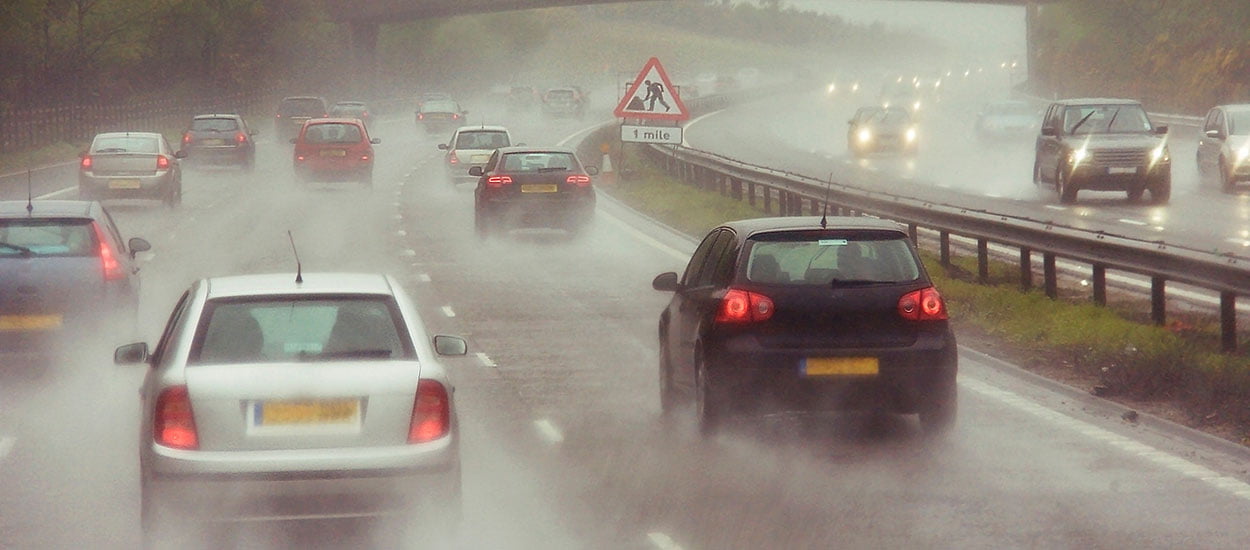Would you support lower motorway speed limits in the rain?
It’s an interesting question, and let’s be honest, probably a slightly divisive one. It was one of the main questions included in a recent RAC survey, which was answered by thousands of drivers. The results might surprise you – the RAC found that about 3/4 (72%) of these drivers would want standard 70mph speed limits on motorways lowered in wet weather, improving overall road safety and encouraging better driving behaviours from those out on the roads.
Now, as we’re sure we don’t need to tell you, the UK isn’t exactly known for its sunny climate, so a change like this would have a pretty significant on day-to-day driving, especially for commercial drivers and anyone else who may find themselves looking for the best van deals. But it’s also not come out of nowhere, either.
To give some context, in 2019 alone, 806 people were seriously injured or killed on British motorways. 30% of those casualties occurred when the road surface was damp, wet or flooded. And in 2018, wet roads were also a factor in some 259 motorway collisions. (From that same years, 242 collisions were also caused by drivers travelling too fast for the conditions.) So in many ways, it’s probably not surprising that so many British drivers want something done about it.
What did supporters of the measure say?
The RAC asked some 2100 people in its survey about whether they thought speed limits should be lowered in wet weather, and as we’ve covered above, a significant majority said yes.
- 33% said that the limit should be reduced to 60mph in the wet
- 7% think that it should be cut to 65mph
- 17% want an even lower limit of 50mph or 55mph
- 14% want to see it cut, but aren’t sure by how much
There was also an interesting amount of variation in the reasons why people thought it would be a worthwhile thing to do. Out of all the supporters of the measure:
- 78% said that lower limits would be effective for encouraging drivers to slow down
- 65% think lower speeds could improve visibility in these conditions, by reducing spray from vehicles in front
- 53% believe that it will reduce overall vehicle speeds, even if some drivers still choose to ignore them
And what’s more, 72% said that they thought lowering the speed limit would save lives, whether or not everyone chose to obey, so it was definitely worth trying. Let’s be honest – it’s hard to argue with the logic in that argument!
If we did decide to make this law, though, we’d only be the second country in Europe to do so. Currently, the only European country to implement a form of this law is France, which reduces its 130km/h limit down to 110km/h in wet weather. (Or 80mph down to 68mph, if that’s more helpful.


Were there any not in favour of lowering speed limits?
Plenty. Some of you are probably reading this very article! As for the RAC survey, a fifth of drivers (21%) said that they wouldn’t be in favour of lowering speed limits, and gave various reasons for their point of view. Here are some of the most prevalent:
- 54% said that drivers already adjusted their speed to the conditions
- 42% think it would be pointless, and that many drivers ignore the existing limits anyway
- 41% don’t think that drivers will obey the new motorway limits anyway, so again it would be a pointless endeavour
Notably, 60% of those not in favour pointed out the inherent difficulty in working out when ‘wet’ weather conditions, as to a certain extent it’s all highly subjective. Do the rules come into force when the road surface is damp, or only when there’s a serious danger of aquaplaning? Or do they apply the moment it starts raining, no matter how lightly or heavily? Whichever way you cut it, there’s still room for confusion, as everyone applies their own individual judgement to it. And if not everyone’s on the same page when out on the roads, that could potentially even end up creating more problems than it solves.
As we’ve touched on above, there’s also the fact that changes like this could end up impacting some drivers far more dramatically than others. While individual members of the public may find it easy enough to adapt, it could prove to be far more challenging for commercial drivers, such as sole traders or couriers making long deliveries. Frequently lowered speeds may make some journeys take much more time, or become much more unpredictable. That might involve fleet managers being faced with making some very complex logistics changes, while for smaller businesses like sole traders, it could make all the difference between the number of jobs they’re able to do in a day, which could ultimately make a noticeable dent in their earnings. So what we’re saying is; there’s likely to be some pushback!
However, if we’re honest, surveys aside it doesn’t look like the government has any intention of actually moving forward with a plan like this anytime soon. Although it’s also significant that nobody has ruled it out, so we suppose time will tell!
If you drive a van yourself, you may well be quite relieved to know that! And speaking of which, if you’re looking at replacing your own commercial vehicles, or expanding your business fleet, then you’re in exactly the right place. Here at Van Discount, we provide a wide range of choice between vans from some of the world’s most prestigious manufacturers, including Ford, Citroen and Peugeot.
What’s more, we save our customers an average of 40% off the price of a new van, and with our in-house expertise and experience, we can even offer bespoke conversions for our customers. Feel free to take a look around our site, and if you’ve got any questions or advice, we’re just a phone call away on 01282 872 530!













